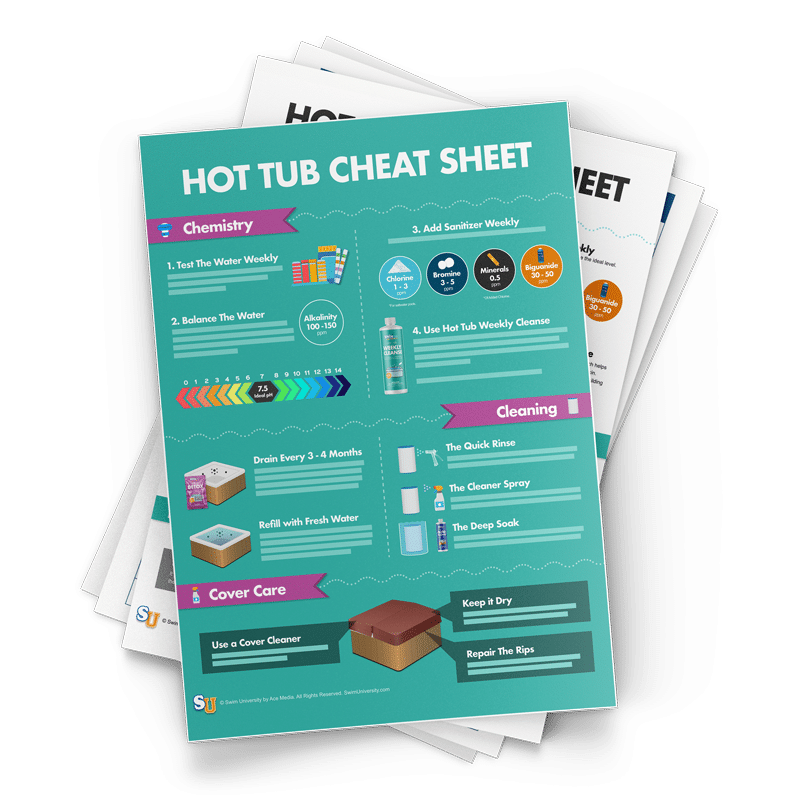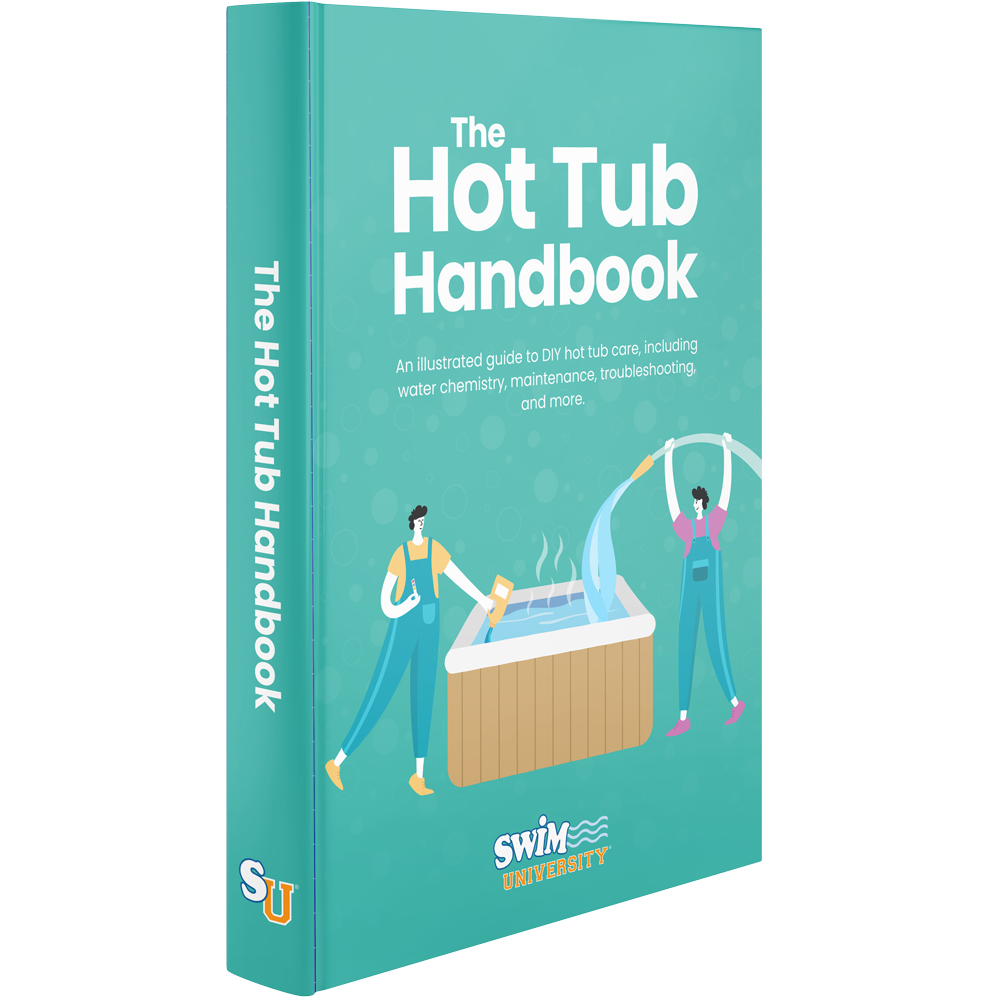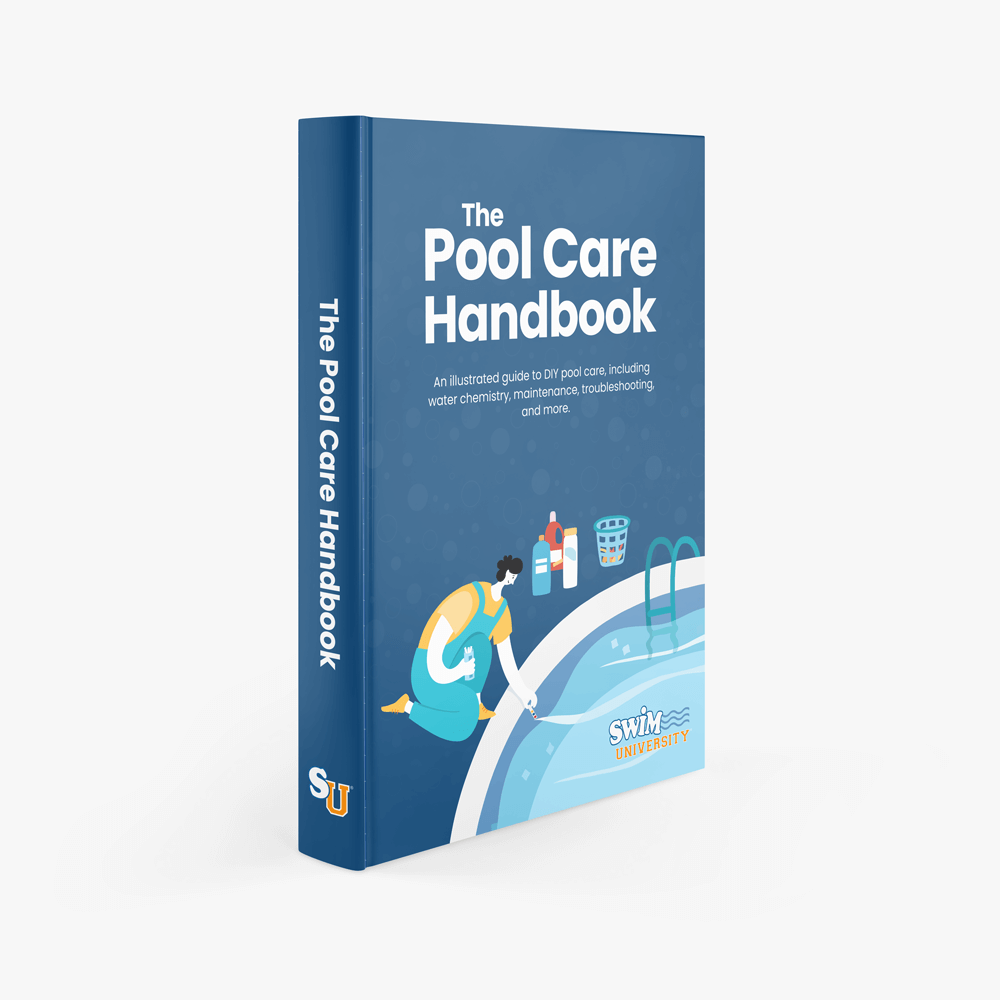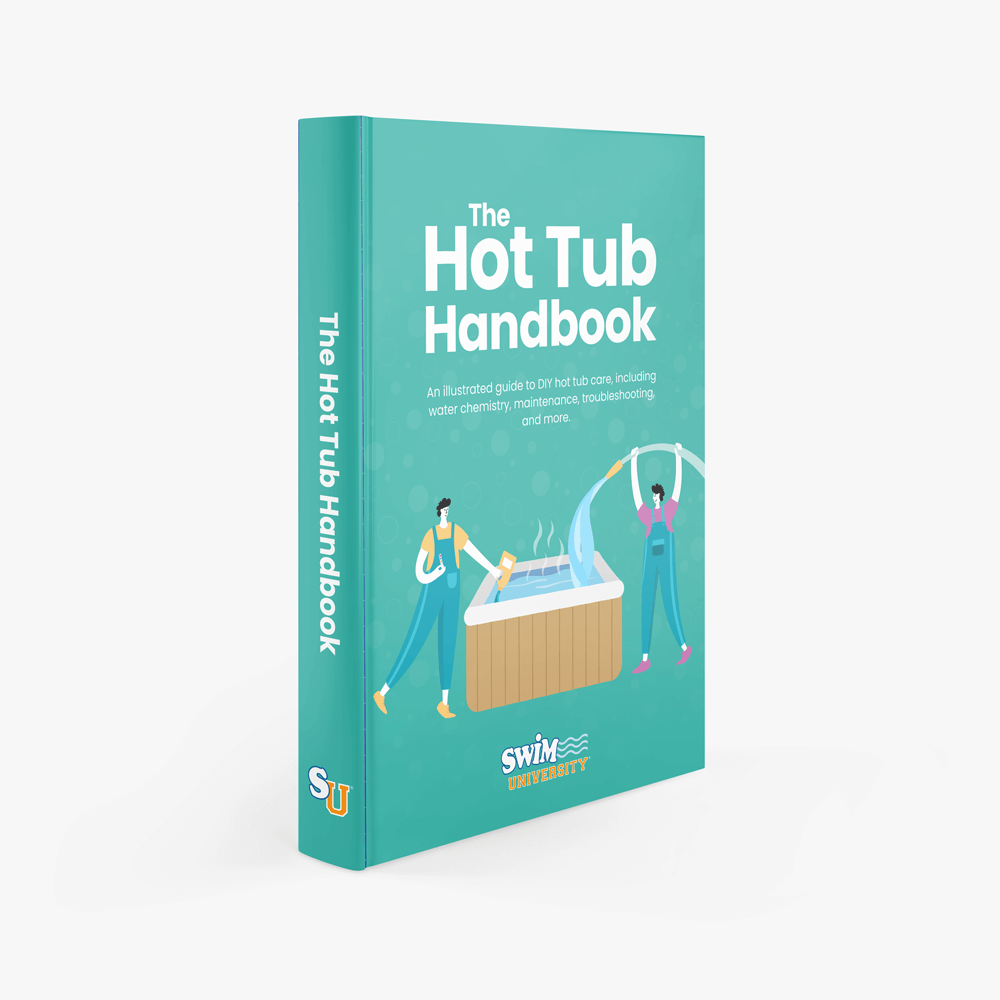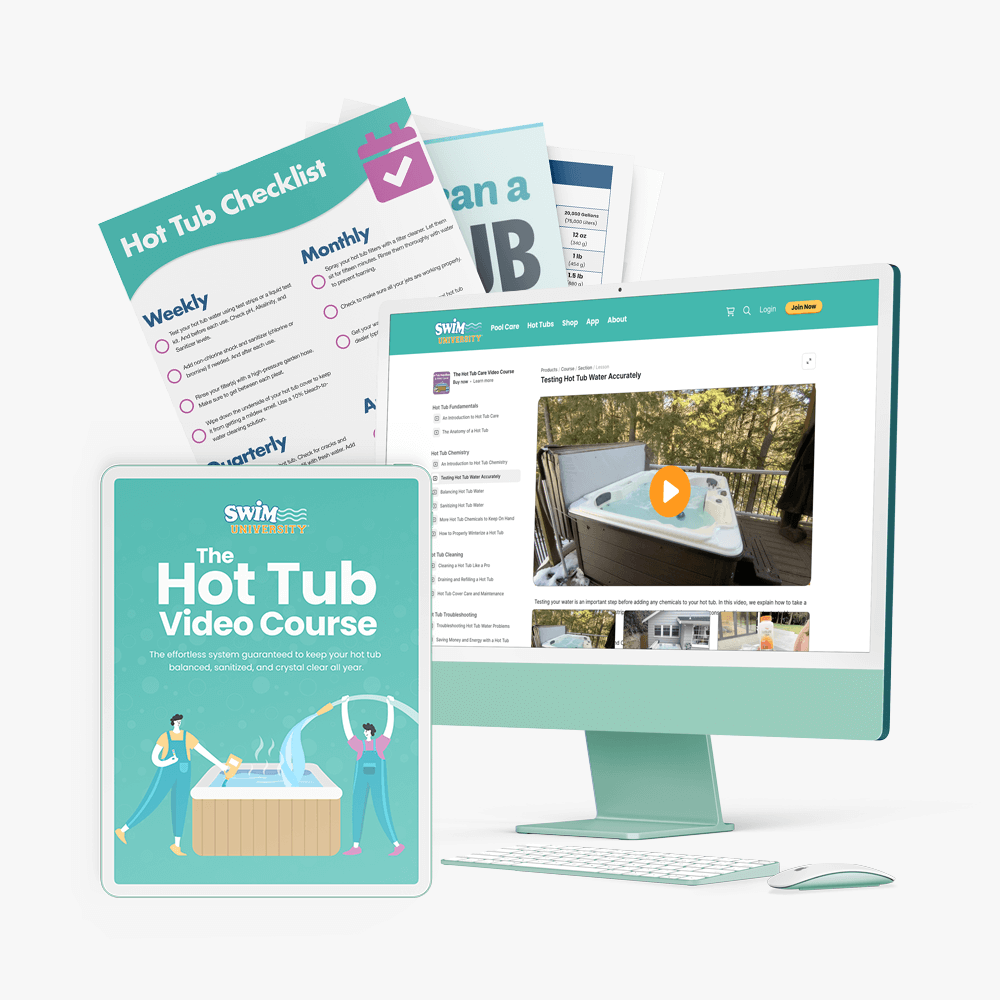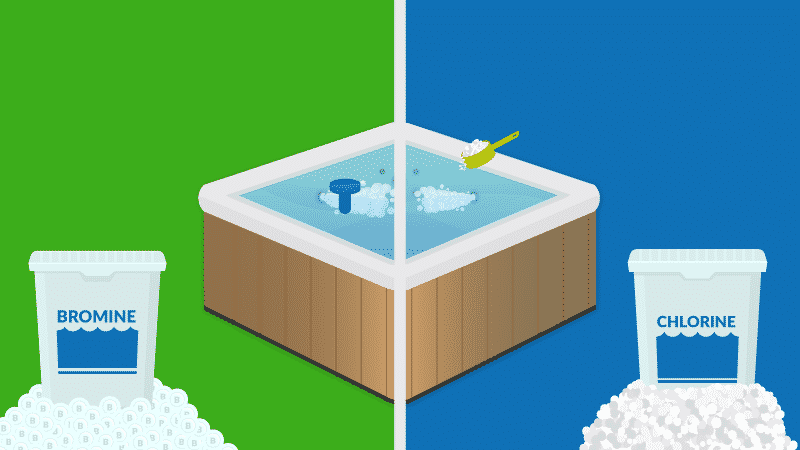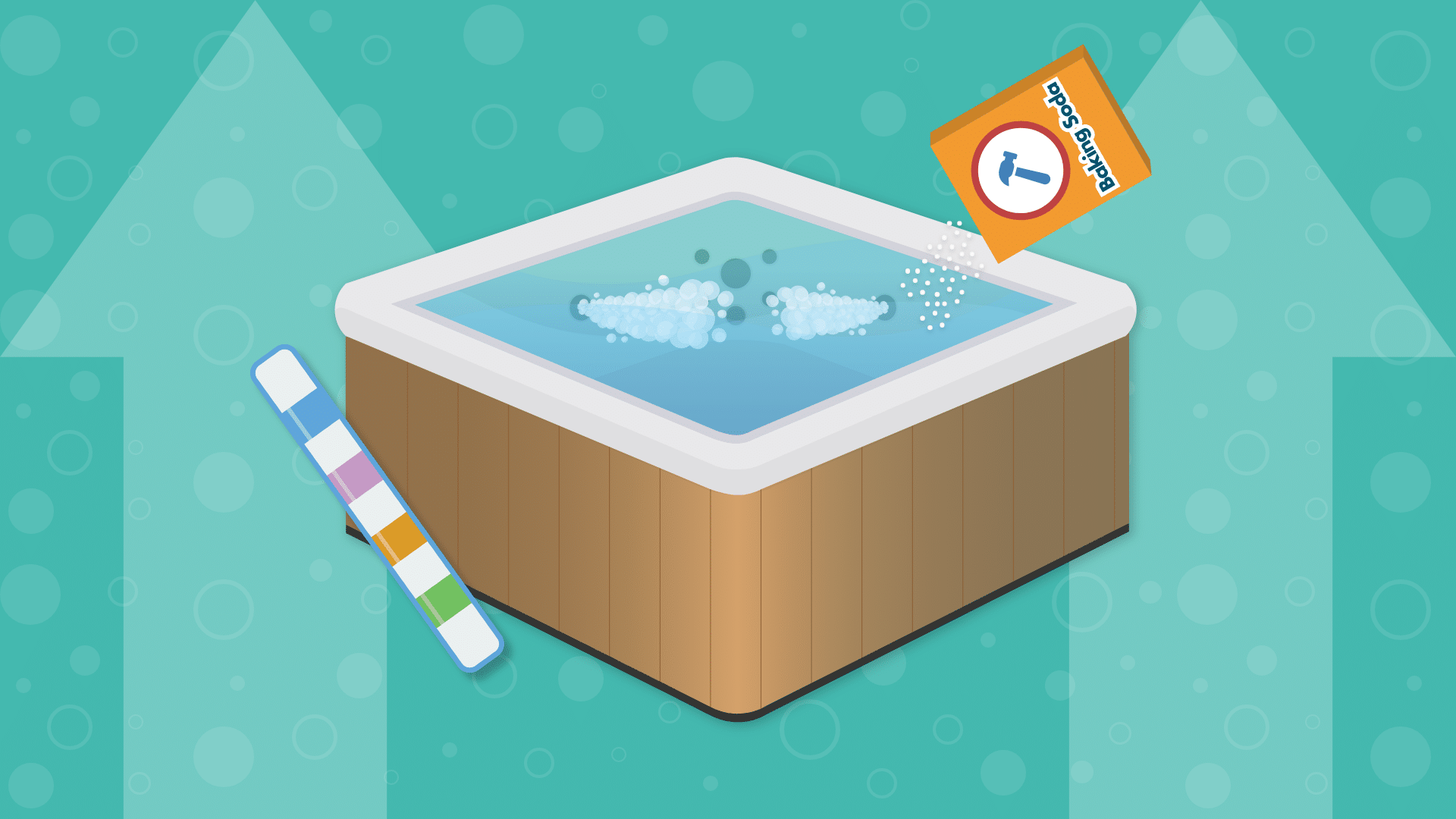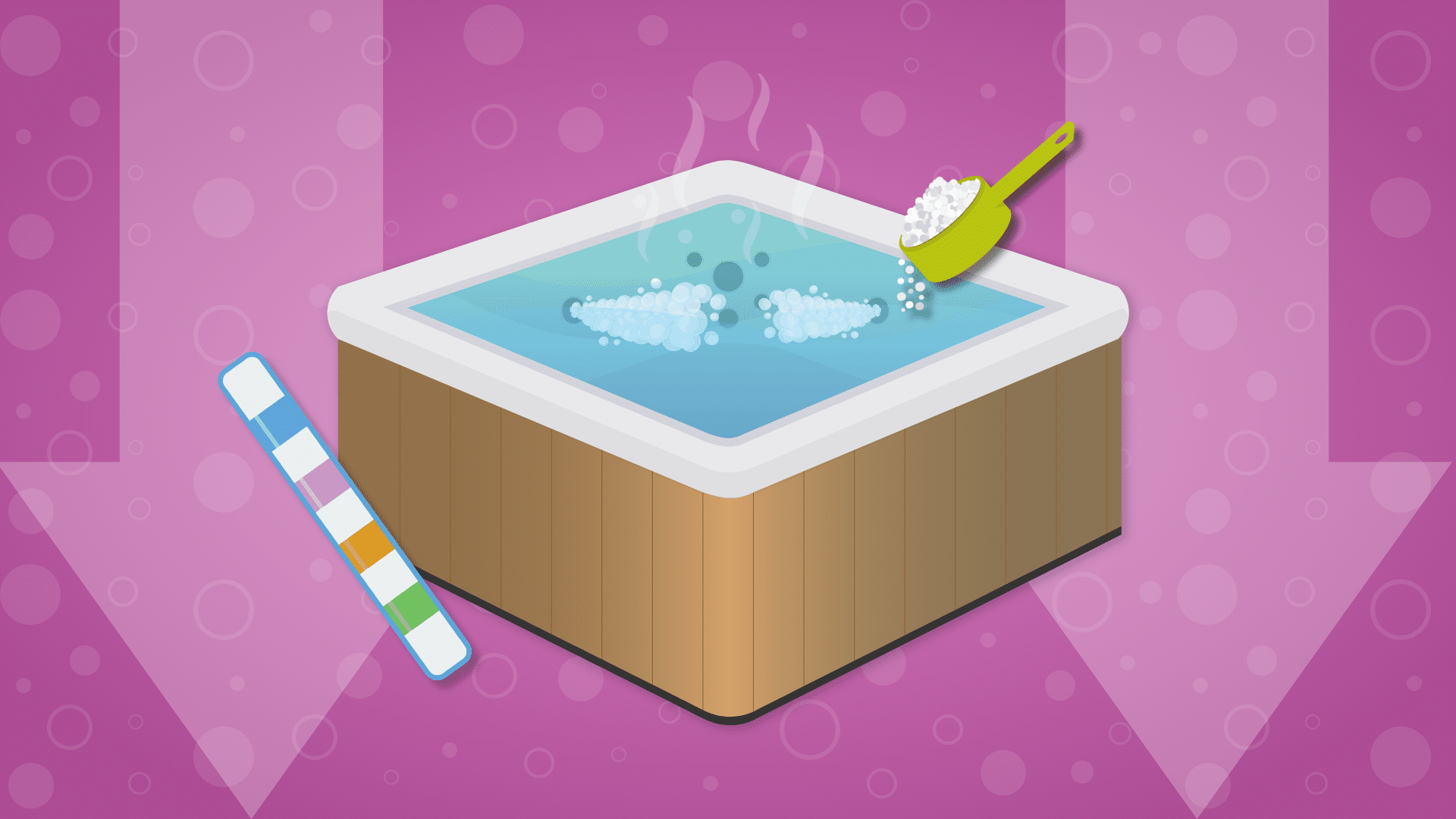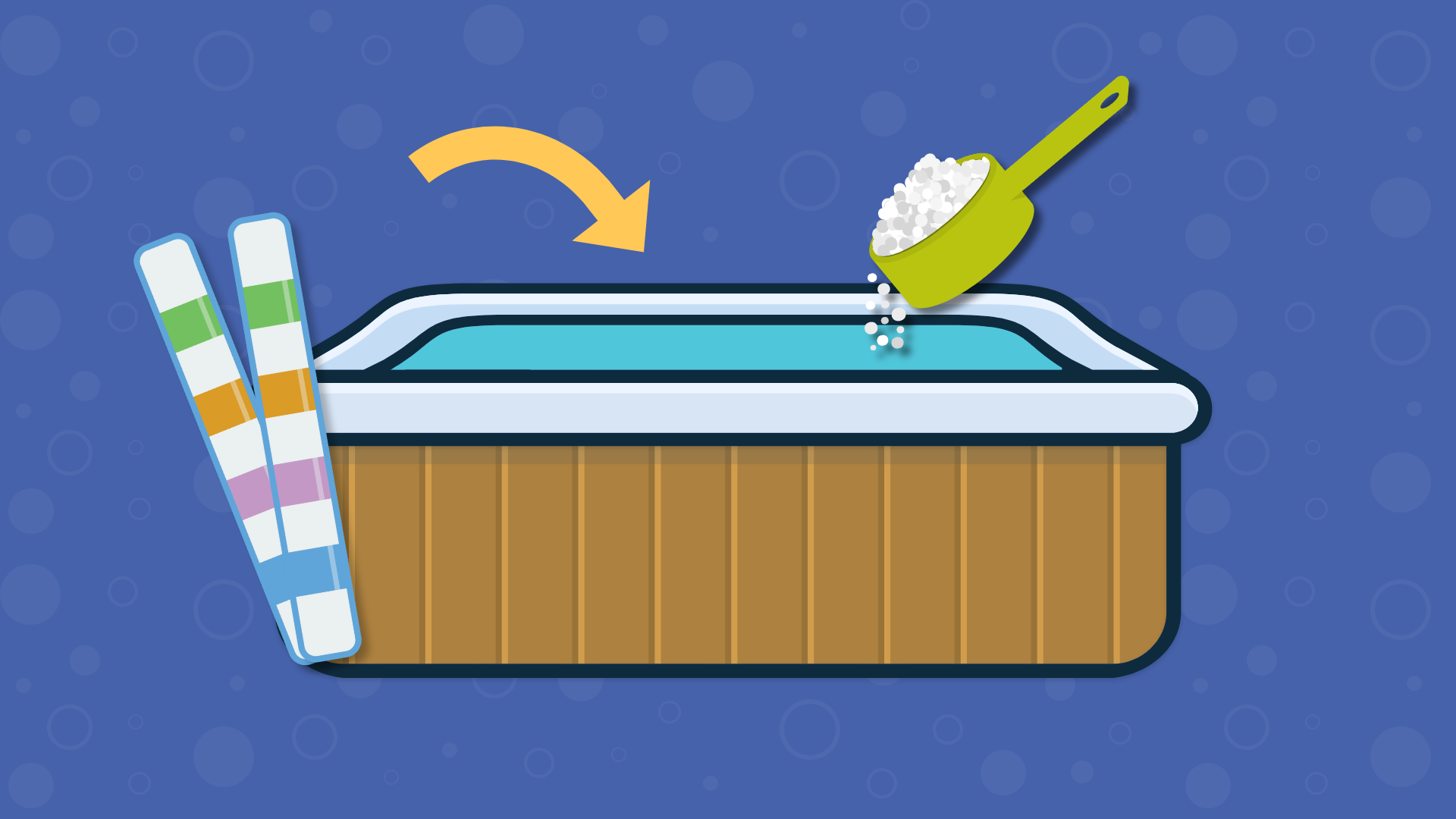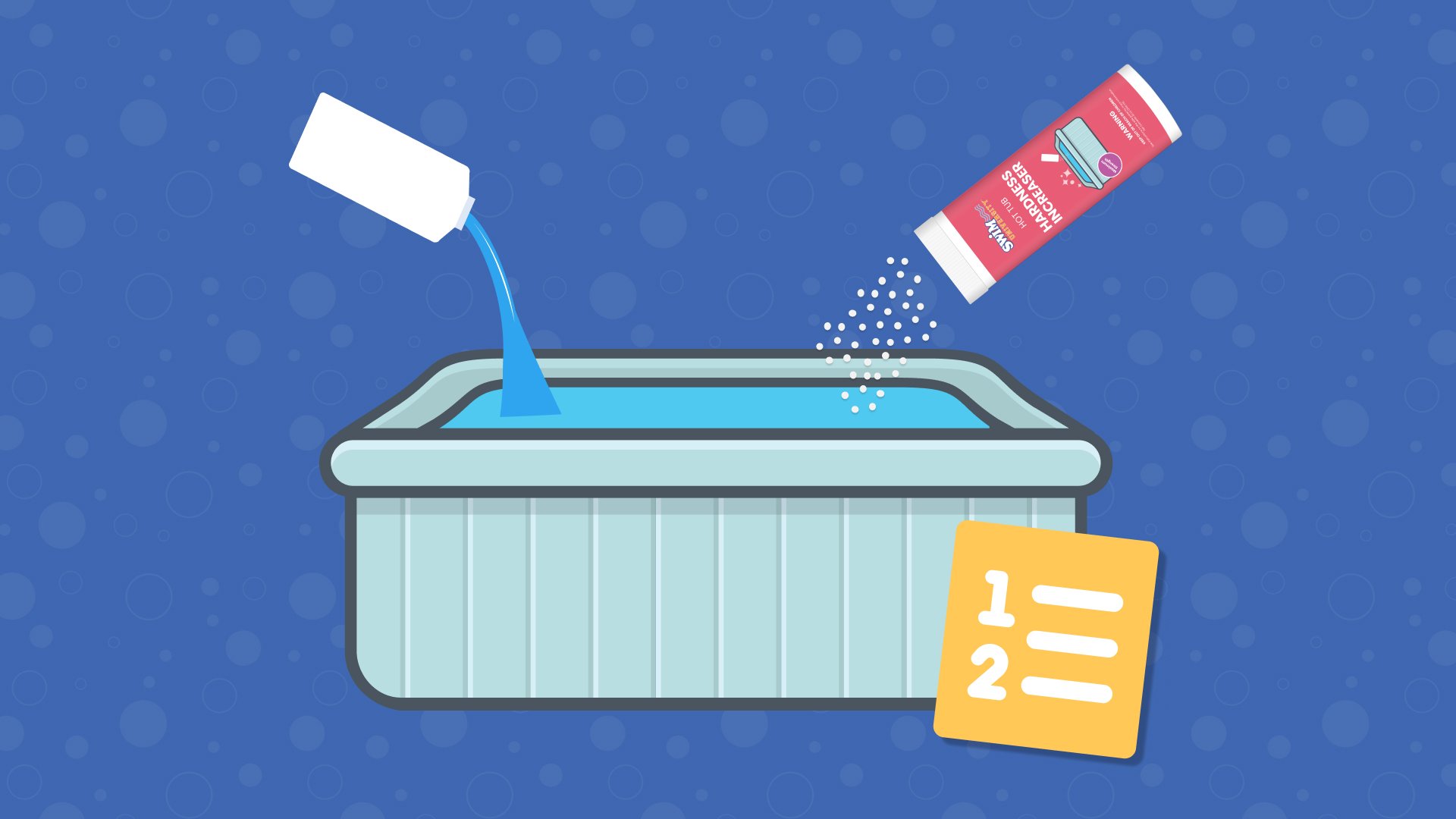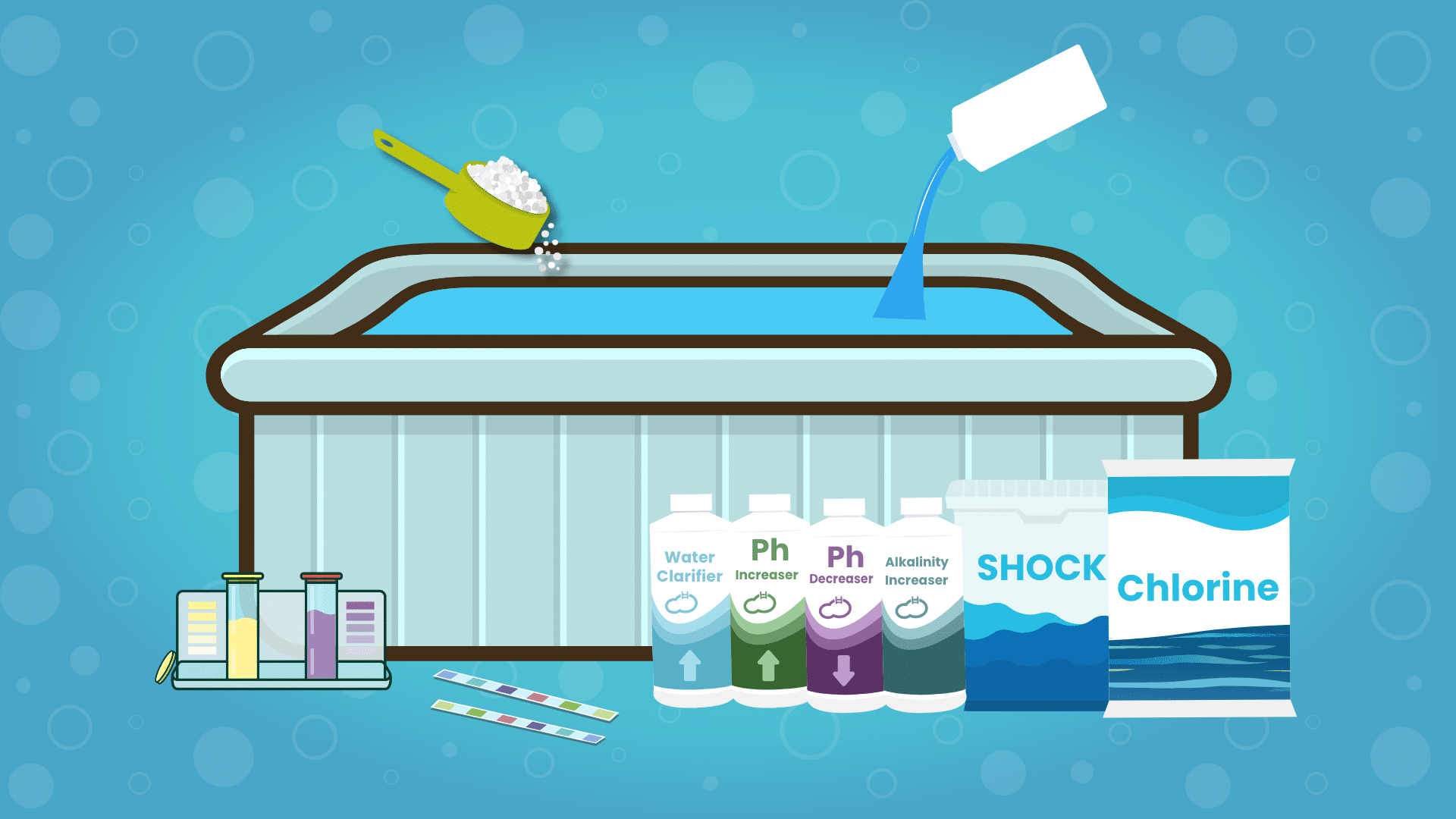How to Lower Bromine in a Hot Tub
Too much bromine in your hot tub can corrode your hot tub parts, damage your pump, and even cause respiratory issues. Thankfully, lowering your bromine is an easy process. And depending on your levels, you might not even have to do anything at all. There are two easy ways to lower bromine. The first involves three easy steps:
- Stop Adding More Bromine (duh!)
- Run Your Hot Tub (with the cover off)
- Dilute Your Water (with fresh water)
Let’s dive into the steps in this article (plus the second method). But first, you need to know some base information.
Learn how to keep your hot tub clear while saving money so you can enjoy more soaking time without big costs. The Hot Tub Handbook covers every type of hot tub on earth.
How to Tell if There’s Too Much Bromine in Your Hot Tub
It’s hard to tell if you have a high bromine level by smell. Bromine has a low chemical odor, which is why it’s commonly used in indoor hot tubs and swimming pools.
The most reliable way to know if you’ve got too much bromine in your hot tub is to test your water with test strips. Most test strips come with both bromine and chlorine readings, but make sure you confirm this before purchasing.
Tests for 7 important chemistries in seconds: Total Hardness, Total Chlorine, Total Bromine, Free Chlorine, pH, Total Alkalinity, and Cyanuric Acid.
If you’re not sure how to test your water accurately, check out our guide on Hot Tub Water Testing.
Testing your hot tub water once per week (and more often if you use it frequently) will ensure you’re not over-sanitizing your water with bromine. High bromine levels can ruin your hot tub equipment over time and be unsafe for hot tub users. However, if you’re adding bromine to the water (granules, tablets, floaters, or an automatic feeder), make sure you’re dosing the water properly and testing after adding chemicals.
Also, be sure you’re testing and balancing your other levels, like pH and alkalinity, regularly, too, since these can affect your bromine.
Did You Know Bromine and Chlorine are Cousins?
Unlike bromine, chlorine has a strong chemical odor. When you add chlorine to your hot tub or pool water, it’s measured as Free Chlorine. As Free Chlorine fights contaminants, it becomes a chloramine (measured by Total Chlorine). This is what causes that strong bleach-like smell. FYI, Free and Total Chlorine levels should be between 1-3 ppm (parts per million).
What’s the Right Bromine Level for a Hot Tub?
Your hot tub bromine levels should be between 3-5 ppm (parts per million). If you use a mineral floater or dispenser, you only need 1 ppm of bromine. But keeping your bromine levels in check is one part of balancing your water chemistry. Here are the right chemical levels for a hot tub.
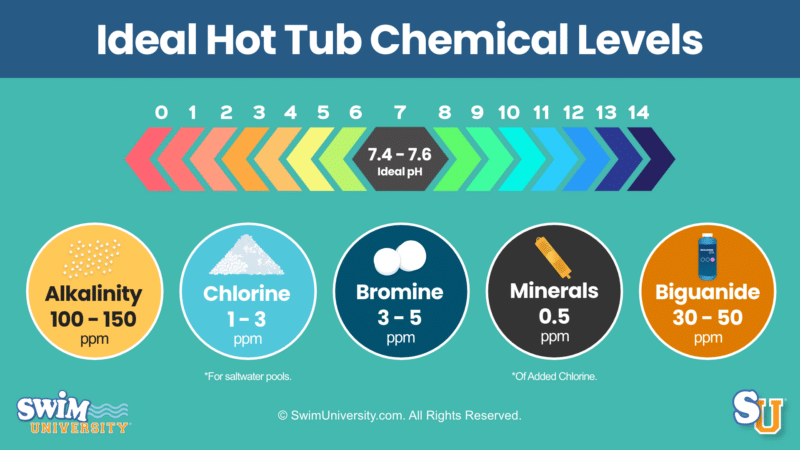
What is a Safe Bromine Level in a Hot Tub?
Keep bromine between 3-5 ppm (parts per million) in your hot tub. This concentration is effective enough to sanitize your hot tub while remaining gentle on your skin and eyes.
How to Lower Bromine in a Hot Tub
Bringing down your bromine levels is one of the simplest problems to fix in a hot tub. All you need is patience and some fresh water.
1. Stop Adding Bromine (Hot Tub Sanitizer)
It seems obvious, but if you’re adding too much sanitizer, stop adding new doses of bromine to your water. That means turning off your automatic chemical feeder, removing your floater, or stopping any source that’s adding bromine.
2. Run Your Hot Tub (Cover Off)
Once you’ve stopped adding bromine, your bromine levels will naturally decrease over time. This usually takes a day or two, but you can speed up the process with water evaporation.
Remove your hot tub cover and turn on your jets to help the bromine evaporate. As the water evaporates, you’ll notice your water water level drop. Make sure your water level doesn’t drop below the skimmer port while your hot tub is running. And be sure to stay out of the hot tub while your bromine levels are high.
3. Dilute Your Water
Once your water level has dropped a few inches, it’s time to add new water. Refill your hot tub with fresh, filtered water and let the water circulate. This should lower bromine levels. Then, test your water again. Your sanitizer levels (bromine) should have dropped.
Keep in mind that all of your other levels (like total alkalinity and pH level) will drop, too. So, test and rebalance everything. I recommend testing your spa water with test strips. They’re quick and easy to use.
If your bromine is still too high after this process, consider removing some of the spa water manually. You can use a bucket, a hose siphon, or a submersible pump (sump pump) to remove more water. And if you need help draining your hot tub water, be sure to check out our other guide on How to Drain a Hot Tub.
How to Lower Bromine with a Bromine Neutralizer
If you don’t want to drain your hot tub or wait for your water to evaporate, you can use a chemical called chlorine or bromine neutralizer. It helps lower bromine levels (and lower chlorine). But this chemical will continue to destroy bromine in your hot tub until the neutralizer is completely used up. It’s easy to use too much, so I recommend only using it in a pinch.
While these products are usually labeled as chlorine neutralizers, their active ingredient (sodium thiosulphate) works in bromine hot tubs, too.
This chemical removes chlorine and bromine from swimming pool water.
How to Keep Your Bromine Levels in Range
Keeping a simple, weekly hot tub maintenance routine is the best way to keep your bromine levels from fluctuating up or down.
- Test and balance your water weekly: Test your alkalinity, pH, and bromine once a week and adjust your chemicals as needed. Test more often if you have high hot tub usage. You can also test for calcium hardness in your hot tub.
- Watch your bromine dosing: Make sure your bromine dispensers, like floaters or chemical feeders, add bromine in the proper amount relative to your hot tub’s size. Always accurately measure your bromine if adding granules by hand.
- Regularly run and clean your filter. This will keep your bromine properly circulating in the water. Here’s a quick guide on how to clean hot tub filters.
- Use an oxidizer (non-chlorine shock) once per week or after each soak. Adding an oxidizer (a.k.a. non-chlorine shock) will help keep your bromine refreshed and active, so you don’t have to keep adding new bromine to your water.
Also known as oxidizer, non-chlorine hot tub shock helps revitalize your chlorine or bromine so it can actively sanitize your water. Use an oxidizer at least once a week but ideally after each hot tub soak to keep your water sanitized.
Frequently Asked Questions About Lowering Bromine in a Hot Tub
I sent an email to roughly 20,000 hot tub owners and asked if they ever had a problem with high bromine. They had questions, and I answered them here.
How do I lower the bromine in my hot tub fast?
Start by partially draining and refilling it with fresh water. This dilutes the bromine concentration. You can also leave the hot tub cover off and let it breathe. Bromine dissipates faster when exposed to air and sunlight. If you’re in a rush, use a neutralizer like sodium thiosulfate.
Is it safe to go in a hot tub with high bromine?
It’s not a good idea. Overexposure can irritate your skin and eyes. And might even mess with your lungs. Always keep bromine levels within the recommended range, which is typically 3-5 ppm. If they’re high, hold off on your hot tub plans until you’ve adjusted the levels back to the safe zone.
Does high bromine cause high pH?
High bromine levels don’t cause a high pH in your hot tub. These are two separate parts of water chemistry. Bromine is a sanitizer, while pH measures the acidity of the water. However, imbalances in one can impact the other. Regularly test and adjust both for optimal hot tub health.
What causes high bromine in a hot tub?
Simply adding too much bromine via granules, tablets, or shock. It can also happen if the hot tub is underused while bromine continues to be added at the same rate. Always adjust your bromine additions based on how much you use your hot tub.
How can I tell if the bromine level in my hot tub is too high?
Test your hot tub water for bromine using fresh and dry test strips (or a liquid test kit). If readings consistently show levels above 5 ppm (parts per million), it’s a red flag. High bromine causes skin and eye irritation. Always test your water regularly to keep things in check.
3 Ways We Can Help With Your Hot Tub
- Hot Tub Cheat Sheets (Free): Easy-to-use guides to help you keep your hot tub water balanced and sanitized.
- The Hot Tub Handbook: An illustrated guide to DIY hot tub care, including water chemistry, maintenance, troubleshooting, and more.
- The Hot Tub Care Course. You’ll get step-by-step videos and a step-by-step downloadable guide with everything you need to know about hot tub maintenance.
